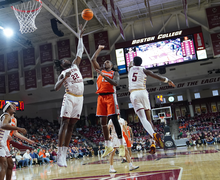Maxwell School’s X Lab merges university research with public sector
Daily Orange File Photo
Established in 2017, the X Lab has collaborated with city governments, federal agencies and non-profits.
Get the latest Syracuse news delivered right to your inbox.
Subscribe to our newsletter here.
The X Lab at Syracuse University’s Maxwell School of Citizenship and Public Affairs is bridging the gap between university research and the public and non-profit sectors.
Previous projects at the lab include aiding the government of Evanston, Illinois, to better understand its 311 non-emergency call program’s use and helping the city of St. Paul, Minnesota, collect garbage fees more efficiently.
Their work is based on two principle pillars: using behavioral science to generate ideas and then proceeding to evaluate those ideas, said Leonard Lopoo in an email statement, the director of the X Lab. Lopoo helped co-found the lab in 2017.
“The idea is to bring the strengths of both sides to help communities improve — to fulfill the mission of the Maxwell School, which is to serve the public good,” Lopoo said in the email. “And part of that is making government run better.”
David Van Slyke, the Dean of the Maxwell School, said the program is effective in educating students and providing them with a platform for research.
“(The X Lab is) a great resource and a valuable form of student experiential learning, applied research, and a contributor to strengthening evidence based policy and public and nonprofit organizational effectiveness,” Van Slyke said in an email statement.
The idea is to bring the strengths of both sides to help communities improve— to fulfill the mission of the Maxwell School, which is to serve the public goodLeonard Lopoo, co-founder of Maxwell School’s X Lab
The X Lab conducted research in May 2018 in conjunction with the city of Syracuse with the goal of helping the city collect unpaid property taxes.
Those who had unpaid property taxes were divided into three groups: those who did not receive a courtesy letter from the city regarding their taxes, those who received a letter and those who received a letter that also had a handwritten note on the outside of the envelope.
Although the normal courtesy notes did not result in any statistically significant change in response rate from those who had not received a letter, the courtesy notes that also had the handwritten note on the outside of the envelope did.
About 45% of the group who did not receive the handwritten note would pay the overdue property tax bills, and almost 50% of those who received a letter with a note paid the bill. A personal touch, the lab found, was the difference.
Cooper Shawver, a senior studying sports analytics and economics at SU, said that the X Lab presented him with problems he never experienced before in the classroom.
“It’s helped develop my skills even further, so it’s all beneficial,” he said.
Despite its possibility to have a large impact, the X Lab community is small, with just a handful of undergraduate and graduate researchers. There will only be two undergraduate assistants this year, with Shawver being one of them.
Before the pandemic, Shawver had the opportunity to see firsthand the bridge between the public sector and university research.
“I’ve been able to sit in on some of the meetings where faculty advisors discuss with [the city of Syracuse].”
Shawver said he recognizes how his work at the X Lab can help communities outside of SU.
“Usually when you do coursework you just pull data, use data … put in an assignment and get a grade back; now there’s actions being taken from the work you do,” Shawver said. “It’s pretty interesting to see how they’re using this data to benefit the city and drive programs.”
Published on August 30, 2021 at 11:20 pm
Contact Kyle: kschouin@syr.edu | @Kyle_Chouinard






